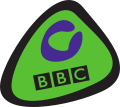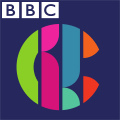BBC Children's and Education facts for kids
BBC Children's and Education is the BBC division responsible for media content for children in the UK. Since the launch of specially dedicated television channels in 2002, the services have been marketed under two brands. CBBC (short for Children's BBC or initialed for Children's British Broadcasting Corporation) is aimed at children and teenagers aged between 7 and 17 with CBeebies offering content for younger viewers. Unlike CBeebies, the CBBC brand pre-dates the launch of these channels and before 2002, CBBC was also the brand name used for all of the BBC's children's programmes.
CBBC broadcasts from 7:00am to 9:00pm on the CBBC Channel. CBeebies broadcasts from 6:00am to 7:00pm on the CBeebies Channel. The brands also have dedicated websites, social media channels and over-the-top media services on BBC iPlayer.
Management
BBC Children's and Education is part of BBC North. Management of the division, in-house production and broadcast and production of presentation links for CBBC and CBeebies is based there.
Overall strategic responsibility for all of the BBC's services for children rests with the Director of Children's, Patricia Hidalgo Reina (since May 2020), with commissioning decisions made by a Head of Commissioning and Acquisitions for the 0-6 age group and 7-12 age group respectively. The 7-12 age group is commissioned by Sarah Muller (since Feb 2021) with the 2-6 age group post waiting to be filled.
Programming
BBC Children's commissions and acquires a wide range of programme types, including drama, pre-school (CBeebies), news, entertainment, and factual programming. CBBC and CBeebies is therefore often seen as offering a similar mix of formats to the wider BBC, albeit tailored to suit a young audience. Byker Grove was one of the very few shows that was not aimed at young children, rather a more teenage/young adult audience as it dealt with some controversial themes.
The longest-running CBBC programme is the magazine show Blue Peter. Other current programmes include 4 O'Clock Club, Almost Never, The Dumping Ground, Got What It Takes?, Horrible Histories, Junior Bake Off, Sidekick, Odd Squad, Shaun the Sheep, Danger Mouse and more...
Scheduling on BBC One and BBC Two
Following the launch of Children's BBC as a branded block in 1985, the introduction of BBC1's daytime schedule in October 1986 led to the daily weekday offering of BBC Children's consisting of
- A 30-minute block at 10:25am usually including the 'main' pre-school show (Play School, then from 1988 Playbus/Playdays) and children's birthday cards on BBC1
- A 15-minute pre-school programme or programmes at 13:20 (often the slot for Me and You)
- The main afternoon block aimed at older children from 15:00 - 17:35.
Weekend programmes consisted chiefly of Saturday morning programmes on BBC1, such as Going Live! and from 1987. BBC2 broadcast children's programming when the Open University was not being shown. This block, which ran between October and January, was initially called Now on Two and was later rebranded to But First This on 2. Children's BBC would also broadcast on weekday mornings during school holidays on either BBC1 or 2, and for a few years from 1987 was also branded But First This. By 1992 children's programmes broadcast all morning on BBC Two leading up to the older pop show The O Zone.
In 1995, children's programmes started to be shown on BBC Two at weekday breakfast. The block was called The Children's BBC Breakfast Show. By 2000, the C BBC Breakfast Show would air from 07:00 to 09:00, extended in the School holidays with C BBC mostly on BBC One in the Christmas holidays, followed by the birthday card slot from 10:00 to 10:50, often linked by one of the Breakfast Show presenters; a single or more preschooler shows would air around 1:00pm, also on BBC Two, linked by one of the presenters and Emlyn the Gremlyn then the afternoon block on BBC One would begin at 3:25pm with a mixture of younger kids shows and older kids' shows, linked by two presenters and Emlyn the Gremlyn. Weekend programmes consisted chiefly of Saturday morning programmes on BBC One with C BBC from 07.00 to 09.00, Linked by the presenters, with Live & Kicking taking over from 09.00 until 12.10. Sunday morning consisted with the C BBC Birthday Cards on BBC One from spring until the autumn with C BBC on BBC Two starting from 08.15 in the spring and summer and at 07.00 in the autumn and winter with the slot finishing at 11.15. In the summer the C BBC slot would begin on BBC Two at 07.00 in it's breakfast show slot before switching to BBC One at 09.00, finishing at 11.15
Relaunch to CBeebies & CBBC
Further changes to the schedule were rolled out during the 1990s and 2000s, including the introduction in the late 1980s of Sunday morning programmes on BBC 2, initially only during the Open University's winter break and then subsequently year-round; the introduction of a regular weekday morning "breakfast show" format, also on BBC Two; the relocation of the daytime pre-school slot to BBC Two, later returning to BBC One at the start of the afternoon block.
The lunchtime block also continued to air on BBC Two. From 1990-1993 like the previous block "See-Saw", this was introduced by the continuity announcer. In 1993 Children's BBC launched a "Lunchtime Club" for this slot and introduced by the then rota of CBBC presenters. In 1996 it was handed back to the continuity announcer's duty again to introduce the programmes. From 1998-1999, just a ident was played out with no announcements.
On 3 September 2001, Children's programming on C BBC got separated in the lead up to the launch of two children's channels which would be separated for different age groups, the C BBC Breakfast Show would air older children's shows from 07:00 to 08:10, followed by a block of younger kids' programmes from 08:10 to 10:50, often linked by one of the Breakfast Show presenters; a single preschooler show would air around 1:00pm, also on BBC Two, then the afternoon block on BBC One would begin at 3:25pm with 25 minutes of shows for the under-sevens, presented mostly in voiceover, followed from 3:50pm by the older kids' shows, linked in-vision.
When the CBeebies and CBBC digital channels began, children's programmming on BBC One and BBC Two remained in the same slots but adopted the new branding. Viewing figures were considerably higher on BBC One and Two as not every viewer could receive the digital channels either because the service was not available in their area or because they had old equipment not able to receive it.
From February 2002, the morning block consisted of 60 minutes of CBeebies-branded content from 06:00, followed by ninety minutes of CBBC from 07:00, then further CBeebies content from 08:30; in the afternoon on BBC One there was a block of CBeebies content from 3:15pm followed by CBBC content for the remainder of the afternoon slot. Following the removal of BBC Schools' content from daytime BBC Two (into the BBC Learning Zone), the time allocated to CBeebies on BBC Two was extended.
2008 - Shift to earlier BBC Slot in weekday afternoons
In February 2008, following the move of The Weakest Link from BBC Two to BBC One, CBBC on BBC One was shifted to run 3:15–5:15 rather than 3:25–5:35 as before in order to accommodate the 45 minute show before the Six O Clock News. The changes were made following the BBC's loss of the rights to soap opera Neighbours, which had for many years been broadcast between the end of CBBC and the start of the 6 pm news; when the decision was made to move daytime editions of The Weakest Link from BBC Two to One to fill the gap, CBBC had to move to an earlier slot as Weakest Link was longer than Neighbours was.
In 2009, a report published by the BBC Trust found that scheduling changes which took place in February 2008, where programming ended at 17:15, had led to a decrease in viewers. This was especially noticeable for Blue Peter and Newsround, two of CBBC's flagship programmes; Blue Peter was recording its lowest viewing numbers since it started in 1958, and Newsround received fewer than 100,000 viewers compared to 225,000 in 2007.
2012 - End of children's programmes on BBC One and BBC Two
Following the decline in viewing on BBC One and BBC Two and as part of the Delivering Quality First proposals submitted by the BBC in October 2011 and approved by the BBC Trust in May 2012, it was announced all children's programming on BBC One and Two would be moved permanently to the CBBC and CBeebies channels following the digital switchover. It was found that the majority of child viewers watched the programmes on these channels already and that only 7% of these children watched CBBC programmes on BBC One and Two only. Children's programming on BBC One ended on 21 December 2012 with the CBeebies' morning strand on BBC Two ending on 4 January 2013.
Occasional returns to BBC One and BBC Two
CBBC programming returned to BBC Two on Saturday mornings in September 2017 when Saturday Mash-Up! launched, however this strand continues to use the regular BBC continuity announcers and not the CBBC presenters.
On 11 January 2021 programming for children returned to BBC Two to provide educational content for children during school closures as a result of the Covid-19 lockdown.
Other services
CBBC Extra
CBBC Extra, launched in 2005 was a free interactive television service from CBBC provided by BBC Red Button which was available on all digital platforms in the United Kingdom. It was accessible from the CBBC Channel by pressing red and then selecting CBBC Extra. It could also be accessed from any other BBC channel by pressing red and going to page number 570. The service differed across digital platforms, for example digital satellite (i.e.: Sky) viewers could access a video loop, however its availability on digital terrestrial (Freeview) was dependent upon BBC Red Button not showing other interactive services, such as major sports events coverage. This was dropped from the Red Button service in April 2016.
CBBC website
The CBBC website provides a wide range of activities for children aged 7–16, such as games, videos, puzzles, print and makes, including now defunct pre-moderated message boards, now replaced with comment threads below videos, games and articles. It also contains a TV guide and an area where kids can apply to be on a show. It provides content for all brands including Tracy Beaker, Sam & Mark's Big Friday Wind-Up, Horrible Histories, Stacey Dooley's Show Me What You're Made Of, Shaun the Sheep, Blue Peter, Newsround, Danger Mouse, The Dumping Ground, Wolfblood, Eve, Dick & Dom, Hetty Feather, Hank Zipzer, The Sarah Jane Adventures and DIXI. It also gives kids the chance to view the CBBC iPlayer to replay or catch up their favourite CBBC programmes for up to 29 days.
Gaelic and Welsh services
BBC-produced children's programming, in native languages of Scotland and Wales, also airs on BBC Alba and S4C respectively.
High Definition Channels
CBBC programmes were also broadcast in high definition alongside other BBC content on BBC HD, generally at afternoons on weekends, unless the channel was covering other events. When BBC HD was closed on 26 March 2013, CBBC HD launched on 10 December 2013.
Logos




